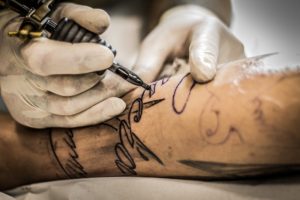Spilling the ink

Image by Felix from Pixabay.
The Volkswagen of Windsor building on Lauzon Road is reflective of the meticulous and deliberate engineering of the cars inside. Spotless white walls leading to clear glass windows are reflective of the upscale clientele.
One person who works in these offices is Brian Mullin. He describes his work as bland, managing finances and checking over warranty coverages. What isn’t so bland is the sleeve tattoo on his right arm, showing the course of his late father’s life from Texas to Quebec.
“It’s essentially a memory to keep him alive, right? Because I did lose him about 10 years ago. So for me, it’s a keepsake and a memory. It’s something that whenever I get to look at it, and I can think of my dad and think of the memories that we’ve had,” Mullin said about his body art in between sips of coffee.
More people like Mullin are popping up. People who are working professionals with regular jobs living average lives who have a tattoo, with the view around body art changing to become accepted and normal.
Within the City of Windsor alone, there are over ten different tattoo shops offering customers a chance to choose their body art. Nestled in a business plaza, Better Days Tattoo stands out by blending in.
Its owner, Dean Sleiman, gives off a similar easy feeling as his shop. He makes his profession known, with tattoos peeking out onto the base of his throat and the back of his hands from underneath his sweater.
“2012 is when I started, and there was a lot of people of any age, any ethnicity, any walks of life that wanted to get tattooed,” Sleiman asserts.

Image by JJ Jordan from Pixabay.
Part of this change could be credited to the changing messages tattoos have developed over time. Research conducted in February at the University of Houston’s C.T. Bauer College of Business found the meaning of tattoos is shifting from an act of rebellion to a sign of belonging.
This research also found tattoos can represent someone’s connection to their faith, career, interests and meaningful life moments. It is for reasons like these Mullin had his tattoo done.
Despite the professions of who gets tattoos staying the same, Sleiman also said the placement of where people get tattoos is something he has seen change the most.
“Personally, me, I won’t tattoo anything below the forearms on anyone that’s just their first couple of tattoos. I mean, you got to think like, a future in a profession or a job that might not accept it,” Sleiman explained.
Labour and employment lawyer Peter Hrastovec said these limitations come from how having a tattoo affects the ability of an employee to do their job effectively.
“For example, if someone has a very strong tattoo that might frighten off retail clients. But if their work is not directly with the public, then it wouldn’t be an issue,” Hrastovec said.
Hrastovec also said employers are usually more accepting of tattooed employees if their positions do not involve them interacting with the public.
Employers having complete bans on tattoos is something Hrastovec considers impossible to apply. One reason can include the number of employees with tattoos being too high to address it properly.
“An all-out ban on tattoos is not going to work. The courts have already addressed that in terms of some arbitrations going back as early as 2011,” Hrastovec explained.
Removing such a ban was the focus of a decision in 2011 that struck down an Ontario Provincial Police policy ordering officers to cover up visible tattoos. The reasoning behind the ban’s removal came from finding it was too broad to be enforced properly.

Image by Kris from Pixabay.
Hrastovec said the employers’ handling of tattoos largely comes down to reviewing things situationally.
“The reasonable approach would be for the employer to look at the situation carefully and determine how this person is going to be rolled out in the workplace, and what their actual role is,” Hrastovec said.
As time goes on, it appears more and more people are finding what’s beneath the skin is what matters the most.
“It’s a different age, it’s a different generation. That’s why I think maybe it would be it’s becoming a little more accepted these days,” said Mullin.
One of the next pieces he’s planning is for nobody but himself. Instead of dedications to family members, it will show all his interests including his favourite superheroes and anime characters.
“Very meaningless, but meaningful for me,” he joked.


